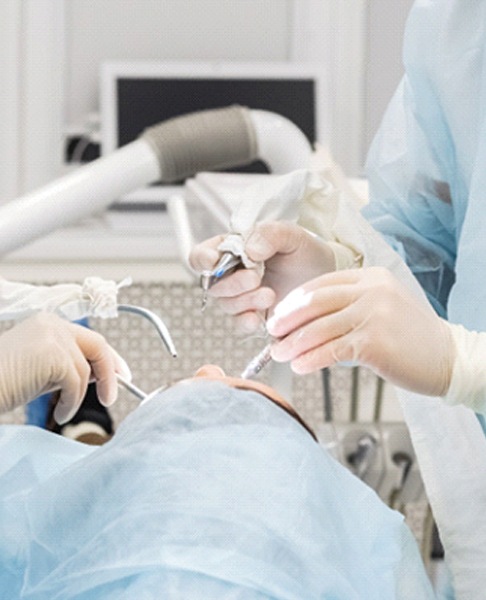Wisdom Tooth Extractions – Dallas, TX
Gently Removing Unneeded Teeth

Most people have four wisdom teeth located at the very back corners of their mouths. The wisdom teeth normally erupt far later than the rest of the teeth, which means they often don’t have the room they need to grow. This causes them to become painfully impacted underneath the gums. To stop the discomfort and damage that wisdom teeth can cause, call Dr. Barnett and the rest of our periodontal team to ask about wisdom tooth extractions in Dallas, TX.
Why Choose Lincoln Park Periodontal and Dental Implant Group for Wisdom Tooth Extractions?
- Three Forms of Comfortable Dental Sedation
- Current, Evidence-Based Techniques
- Honest & Transparent Treatment Plans
What are Wisdom Teeth?

Wisdom teeth (or third molars) are teeth that typically erupt between the ages of 17 and 25. While the age at which they appear can vary, they are widely considered to be an “evolutionary relic” of humans.
Thousands of years ago, hunter-gatherer communities would often lose teeth due to their incredibly rough and scarce diets. When meat wasn’t available, they would need to eat very tough plant materials, such as reed plants. This put a lot of stress on the back teeth, resulting in tooth loss. In these circumstances, having third molars helped them survive until the next meal.
Today, wisdom teeth are not particularly useful anymore and in many cases can be more harmful than helpful when left inside the mouth. Not only is there usually not enough space for them, but they can lead to many complications down the road.
Why Do Wisdom Teeth Need to Be Removed?

Surprisingly, not everyone has to have their wisdom teeth removed. The surgery becomes necessary if:
- The wisdom tooth fails to break through the gums all the way or at all.
- The wisdom tooth grows at an angle, damaging the teeth next to it.
- The wisdom tooth causes a significant amount of pain.
- The wisdom tooth cannot be properly brushed or flossed, increasing your risk of cavities and gum disease.
- A cyst forms around the wisdom tooth.
What to Expect During Wisdom Tooth Removal

Ahead of wisdom tooth removal, our periodontist will perform a detailed exam to confirm if your wisdom teeth need to be removed. If this is the case, they’ll schedule you for surgery.
First, the periodontist administers the necessary anesthetics as well as sedation if requested. Next, one of two steps will happen. If the tooth is easily accessible, then a dental elevator will be used to gently rock the tooth back and forth so it can be removed from the jaw. Alternatively, if the tooth is trapped underneath gum tissue (or impacted), a small incision in the gums is made in order to reach it. In either case, it’s not uncommon for the tooth to be broken into smaller portions and removed bit by bit, rather than as one whole piece.
Recovering from Wisdom Teeth Extraction

After the surgery, we’ll have a number of instructions for you to follow in order to minimize your pain and prevent complications. A piece of gauze can be used to reduce the bleeding that occurs after the surgery, and if you need to, you can apply ice packs to the swollen areas in your mouth. Drink fluids at regular intervals so that you don’t become dehydrated. You can eat any kind of soft food as long as you chew away from the surgical site.
Understanding the Cost of Wisdom Tooth Extractions

Having a wisdom tooth extracted is a very common procedure that can, at times, be medically necessary. However, despite how widespread they are, it can be hard to find information about how much they cost. Here at Lincoln Park Periodontal and Dental Implant Group, we believe in full transparency when it comes to your financial options. If you think a wisdom tooth extraction may be in your future, read on to learn more and ease your mind.
Factors That Can Impact the Cost of Wisdom Tooth Extractions

Because no two cases are alike, it can be difficult to give an exact price estimate for your wisdom tooth extraction. There are a number of different factors that contribute to the overall price of your treatment, such as:
- The Number of Teeth Being Removed: While many people develop all four wisdom teeth, it’s not uncommon to see patients with only one to three. It’s also not always necessary to remove your wisdom teeth if they aren’t a hazard to your dental health.
- Whether Impacted Teeth are Present: Impacted wisdom teeth don’t rise above the gumline and often require additional surgery to remove properly. This increases the complexity of the procedure and raises the cost.
- The Type of Sedation Required: For some patients, local anesthetic is sufficient to perform a wisdom tooth extraction. However, for others, some level of sedation may be necessary to reduce pain or anxiety.
- Who Performs Your Procedure: At Lincoln Park Periodontal and Dental Implant Group, Andrew Barnett perform every wisdom tooth extraction. If there’s ever an extremely rare case that must be referred to an oral surgeon, additional costs may apply.
Does Dental Insurance Cover Wisdom Tooth Extractions?

While many insurance plans offer some coverage for surgical dental procedures, others don’t. Everything hinges on your insurance plan and whether you’ve met your yearly deductible. Your insurance company will also investigate variables like whether your periodontist is in-network to decide when a payout is warranted. Regardless of the details, our expert staff will handle your claim for you. This way you can focus more on your recovery and less on paperwork.
Other Options for Making Wisdom Tooth Extractions Affordable

If you don’t have insurance, it’s not a problem. We offer flexible financing through CareCredit, a third-party option that offers little to no-interest payments. You can bill your procedures using your CareCredit account and make payments on it just like you would a regular credit card. This option truly makes paying for a wisdom tooth extraction a breeze.
Wisdom Tooth Extractions FAQs

Our team is ready to help you say farewell to troublesome wisdom teeth. Before you contact us to schedule an appointment, however, you may want to learn more about the road ahead. To help you out, we have put together a list of some frequently asked questions about wisdom tooth extractions in Dallas. If you do not find the information you were hoping for, feel free to give us a call — we are always happy to chat with patients and potential patients.
Does Everyone Have Wisdom Teeth?
Most people develop four wisdom teeth in their late teens or early 20s. However, there are some exceptions. According to one estimate published in the Dental Research Journal, between 5% and 37% of people are missing one or more wisdom teeth.
No one knows for sure why some people never develop their third molars. However, genetics are likely to have something to do with it. If one of your parents does not have all of their wisdom teeth, you are more likely to be missing at least one of them.
Keep in mind that even if you cannot see your wisdom teeth, you may still have them. An X-Ray can reveal how many you have and whether they are posing an imminent threat to your oral health.
How Should I Prepare for My Wisdom Tooth Extraction?
One of the best things you can do to prepare is ask questions — being well-informed about the procedure can help you go into it with confidence. Some other practical steps you can take include:
- Arrange for a friend or family member to drive you to and from your appointment, especially if you will be sedated.
- Make sure your dentist in Dallas knows about any medications or recreational drugs that you use.
- Avoid smoking for at least 12 hours before your procedure.
- Wear comfortable clothing.
- Stock up on soft foods that will be easy for you to prepare while you are recovering from your surgery.
How Do You Make Wisdom Teeth Pain Go Away?
The only way to permanently get rid of painful wisdom teeth is to have them extracted. Prior to your surgery, you can make yourself as comfortable as possible by using at-home pain remedies. For example, you may wrap an ice pack in a towel and apply it to your cheek for 20 minutes at a time. This can reduce swelling and minimize discomfort. Additionally, you can try taking over-the-counter pain medications, such as ibuprofen. Using an over-the-counter numbing gel, as well as rinsing with a saltwater solution, could also help to keep pain under control.
Is Wisdom Tooth Removal Painful?
Our periodontist want patients to be comfortable, so they will make sure that your mouth is numb before they get to work on removing your wisdom teeth. We also offer various types of sedation, which can help you relax and reduce your body’s ability to feel pain.
After your surgery, some soreness is to be expected. You can make yourself more comfortable by eating soft foods, getting plenty of rest, and taking pain medication as directed.
Why Do We Have Wisdom Teeth?
Early humans needed their wisdom teeth to grind raw plant matter and meat into a pulp that could be easily swallowed since they didn’t have the technology to cook their food. Accordingly, they had larger jaws that could accommodate their emerging wisdom teeth. Since humans have since been cooking their food, our jaws have gotten smaller and the wisdom teeth no longer play the crucial role they once did. However, some experts claim that eating tough foods in childhood can stimulate jaw development so that the wisdom teeth are more likely to fit in adulthood. However, this has become increasingly uncommon, and wisdom teeth today often do more harm than good when they erupt.
Why Are Wisdom Teeth Called That?
Since it doesn’t seem terribly wise for these teeth to grow in at odd angles and cause painful oral health problems, you may wonder how they got their name. As wisdom comes with age, these third molars came to be called “wisdom teeth” because they are the last set of teeth to emerge and they do so in early adulthood.
How Long Does Wisdom Tooth Surgery Take?
Since you will most likely be sedated when having your wisdom teeth removed, you are unlikely to realize how much time passes during the procedure, which makes it seem to be over very quickly. On average, a wisdom tooth takes about fifteen to twenty minutes to be removed, and removing all four can take up to ninety minutes. However, the total time needed varies according to the tooth’s location, position, and factors like whether it is impacted. After your consultation, your dentist can give you a proper estimate of how long you can expect your procedure to take.
When Can I Use a Straw After Wisdom Teeth Removal?
After a wisdom tooth is extracted, a blood clot forms over the empty socket to protect the vulnerable tissues within. Drinking through a straw creates a sucking force that can pull this blood clot out of place, resulting in a miserably painful condition called dry socket. Most dentists recommend waiting at least two or three days before using a straw again, but the exact length of time until you can depends on factors like your age, medical history, and rate of healing. After your consultation, your dentist can give you a personalized recommendation based on your particular situation.
